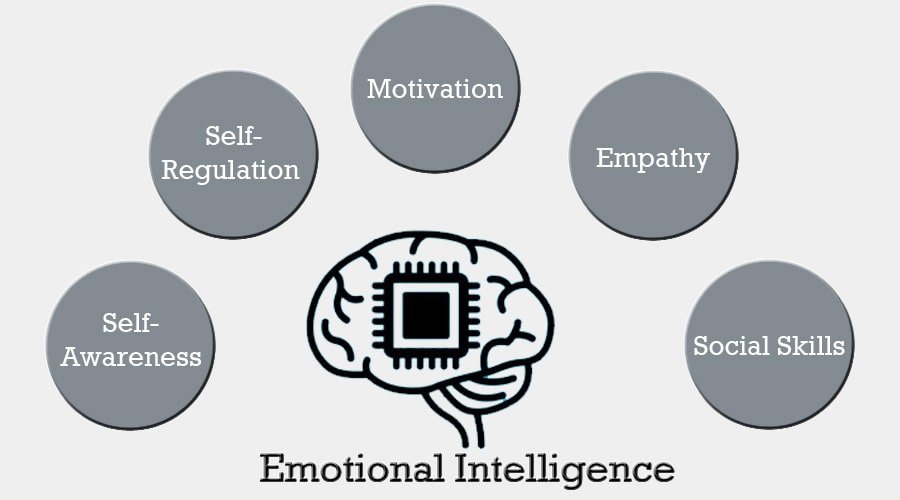Emotional Intelligence

Emotional intelligence (EI) is more than just a trendy term; it is a vital skill that influences every aspect of our lives, both personal and professional. Imagine handling a difficult conversation at work or staying calm under stress during a challenging day. Those with high emotional intelligence can read the room, recognize their own feelings, and respond to others with empathy. This ability not only improves relationships but also builds resilience, making EI a crucial asset in today’s competitive world.
Whether you are aiming to enhance your leadership abilities, strengthen personal relationships, or gain a deeper understanding of yourself, EI is the key. Start on this journey to unlock your potential and learn how to utilize this powerful tool for a more fulfilling life.
Key Components of Emotional Intelligence
EI consists of several skills and behaviors. While some people may naturally excel in certain areas, the good news is that EI can be learned, developed, and improved over time. The main components of EI include:
Self-Awareness
People with high EI have a strong ability to assess themselves. They understand their emotions and know how to manage them effectively. They avoid letting their feelings control them or dictate their decisions. For example, someone with high EI might anticipate feeling angry and use strategies to manage their anger, preventing an outburst at an inopportune moment.
Self-Regulation
Self-regulation is the ability to think before acting. It involves analyzing the situation and choosing the most appropriate response rather than reacting impulsively. Emotionally intelligent people are skilled at avoiding negative reactions, which helps maintain harmony and control.
Motivation
Individuals with high EI are motivated to achieve long-term goals over immediate gratification. They have trained themselves to resist impulsive decisions, focusing instead on what will benefit them in the long run. They are driven by challenges, strive to improve their efficiency, and maintain high productivity.
Empathy
Empathy allows individuals to understand and share the feelings of others. People with high EI demonstrate empathy naturally, which helps them make decisions without judgment, recognize others’ needs and desires, value different perspectives, and live with honesty and openness.
Social Skills
High EI individuals can adapt to almost any social situation. They are often seen as approachable and likable, and they are mindful not to center conversations solely on themselves. By leveraging their empathy, they can help others grow and resolve conflicts smoothly, communicate ideas clearly, and maintain healthy relationships.
Why Emotional Intelligence Matters
Humans are inherently social beings. Building positive relationships and collaborating effectively can make our lives more productive and satisfying. Studies show that higher EI is linked to greater happiness and overall life satisfaction.
Even in difficult situations, EI helps us find solutions to problems. On a personal level, emotional intelligence can help us:
- Engage in difficult conversations without hurting others’ feelings.
- Recognize our emotions when stressed or overwhelmed.
- Improve relationships with those we care about.
Professionally, EI can help us:
- Resolve conflicts effectively.
- Motivate and coach others.
- Foster a collaborative work environment.
- Create a sense of psychological safety within teams.
Strategies to Enhance Emotional Intelligence
Recognize and Name Your Emotions
Regularly check in with yourself to identify what you are feeling and why. This self-awareness helps you manage your responses more effectively.
Seek Feedback
Ask for feedback from friends, family, or colleagues to gain insights into how your emotional responses are perceived. This can help improve your self-awareness.
Practice Active Listening
Focus fully on what others are saying, without planning your response while they talk. Pay attention to both verbal and non-verbal cues to deepen your understanding of others’ emotions.
Read Literature
Engaging with stories that feature complex characters can enhance your empathy and social awareness by exposing you to different perspectives.
Journaling
Reflect on your daily interactions and emotional responses by keeping a journal. This practice can help you identify patterns in your emotions and reactions, promoting better self-awareness.
Develop Empathy
Participate in activities that encourage empathy, such as open discussions about feelings or group exercises that require understanding others’ viewpoints.
Utilize Mindfulness Techniques
Practices like meditation can help you become more aware of your emotions and reactions, leading to better emotional regulation and decision-making.
Channel Emotions Constructively
Express your emotions in healthy ways, such as through conversation, creative activities, or physical exercise. This helps in managing stress and improving emotional health.
Be Open and Curious
Create an environment where discussing feelings is welcomed. Show interest in others’ emotions and experiences to build trust and strengthen relationships.
Take Responsibility for Your Actions
Acknowledge mistakes and learn from them. Apologizing when necessary shows emotional maturity and strengthens your connections with others.
Conclusion
Emotional intelligence is a powerful tool that can enhance every aspect of your life. By focusing on developing skills like self-awareness, empathy, and self-regulation, you can improve your relationships, handle stress more effectively, and achieve personal and professional success. Cultivating EI is a journey that leads to greater happiness, resilience, and fulfillment. Start today, and watch how this transformative skill can change your life.
Thank you for your sharing. I am worried that I lack creative ideas. It is your article that makes me full of hope. Thank you. But, I have a question, can you help me?